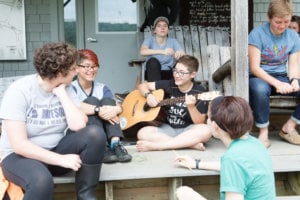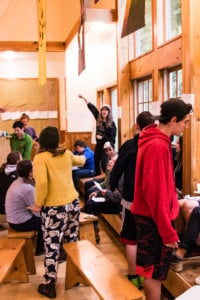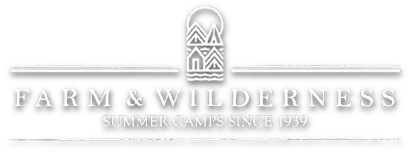 How can one explain how a community comes together for seven weeks, the highs and lows, the silliest moments and the most beautiful, and what we accomplished? What will campers say when asked what they did this summer? What did they learn about themselves and others?
How can one explain how a community comes together for seven weeks, the highs and lows, the silliest moments and the most beautiful, and what we accomplished? What will campers say when asked what they did this summer? What did they learn about themselves and others?
It’s hard to succinctly explain what we do at Tamarack Farm. How analyzing relationships, intimacy, cliques, and exclusivity make for complex and strong social bonds. How breaking into discussion groups on gender identity creates space for campers to reflect on patriarchy and trans oppression. How racial justice nights helps teens to examine systems of oppression and how this oppression is internalized and expressed. And how we may fight together for justice. And how this fight asks us all to be our best selves, better every day.
The last week of camp has two major pieces of programming prompting teens to reflect on their summer: Town Meeting and our closing candle ceremony. Town meeting is a weekly event at TF, where we come together to discuss an issue or concern affecting the entire community. Typically, teens suggest topics, which can range from the serious concerns of gender inequality to the frivolous, like naming the truck to “Ferdinand The Swagmobile.” The last town meeting, however, has the same topic every summer: Bringing TF home.
Campers gathered into pairs and quartets and discussed what was different about camp and their home communities, what they learned here, and what they wanted to bring home. Then small groups went around and shared salient points from their conversations. Teens discussed ways in which they felt their best selves here, and how to bring these aspects of themselves home – in environments where they may not be affirmed every night via a box painted like a tiger. Campers also discussed how building community is difficult. Coming to a beautiful farm doesn’t mean leaving society behind, as we carry culture, insecurities, body talk, and systems of oppression within us. And how to break down these barriers along with simple branching out of one’s friend group is constant work of self-reflection.
After the madness and excitement of Fair, Tamarack Farmers gather in the silent meeting circle facing a ring of lit candles. Each candle represents the Quaker light within us that we put into the community, and now we must leave and take The Light with us. This is the closing ceremony, and typically it is a long night of silent reflection, with some members of the community choosing to speak as they take their candle.
This summer’s candle ceremony was unlike any other I have experienced – every member of the community chose to share, save one, including campers who struggled with public speaking finally felt comfortable to share what they wanted to take home from camp. It was an emotional night – not simply because people were sad to be leaving the community we had built, but because there was genuine honesty and self-reflection in the words being spoken. I felt incredibly sad to not be living with these impressive young people anymore. And I felt honored to know that we did good work this summer and that the growth we felt that was taking place was indeed happening and being articulated in ways I couldn’t have anticipated.
Campers spoke about learning to work collectively, not only in competition with each other,  and taking that home. They mentioned feeling empowered to speak up and use their voices, despite a society that asks them not to because of their age, gender, and color. They spoke on about a work ethic they wanted to take home, to improve on, to believe in work for the sake of giving to something they loved, and not for monetary or social gain. They spoke on learning to be less defensive, to take feedback for the greater good of themselves and others. They spoke of the beauty of a community they all helped to create, every single one, and how heartbroken they were to leave it.
and taking that home. They mentioned feeling empowered to speak up and use their voices, despite a society that asks them not to because of their age, gender, and color. They spoke on about a work ethic they wanted to take home, to improve on, to believe in work for the sake of giving to something they loved, and not for monetary or social gain. They spoke on learning to be less defensive, to take feedback for the greater good of themselves and others. They spoke of the beauty of a community they all helped to create, every single one, and how heartbroken they were to leave it.
Tamarack Farm is more than a summer camp. It is more than whittling on a porch. It is building together and taking things apart. And figuring out who we are every step of the way – for ourselves, for each other, and for the common good when we leave here.
Save
Save




